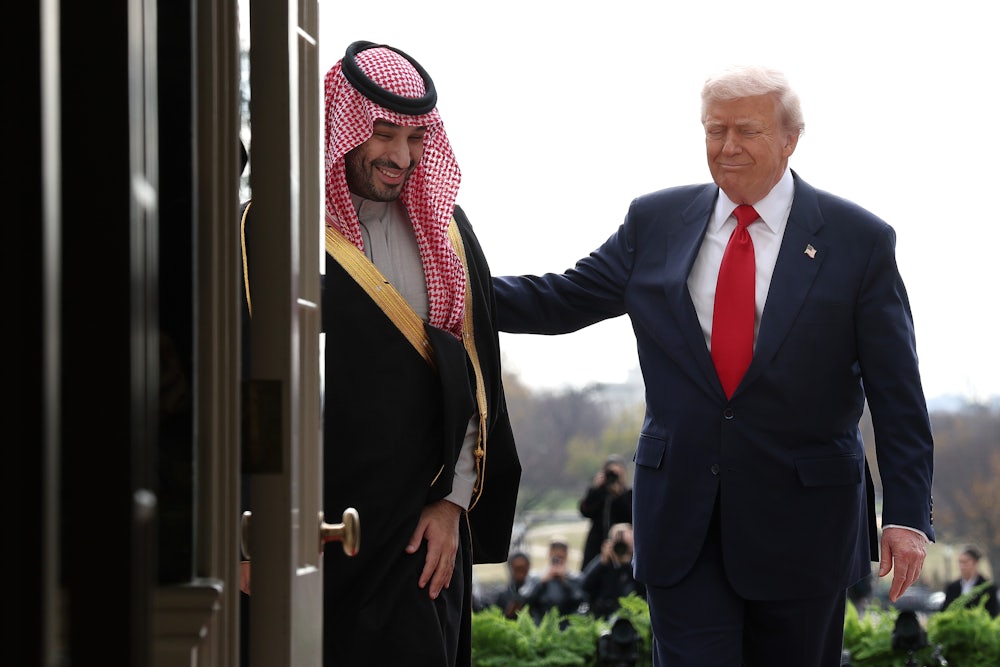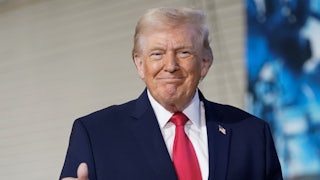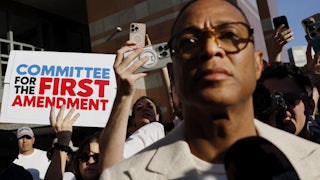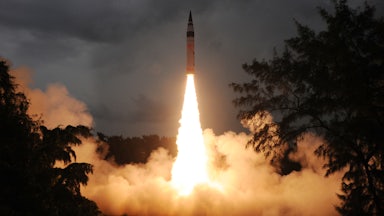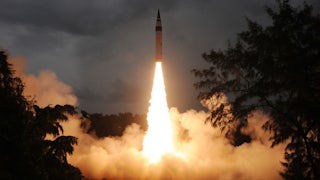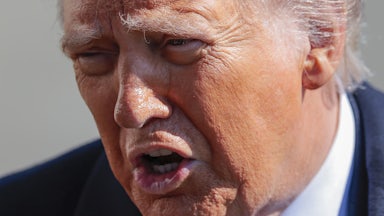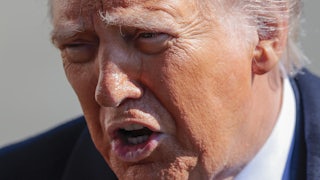The best moment of the 2026 World Cup may have already happened. It might not even matter.
On Sunday, in the final seconds of a tied qualifying match between Ireland and Hungary—win and you reach a playoff, lose and you go home—Ireland goalkeeper Caoimhin Kelleher launched a ball from the halfway line into Hungary’s box. The ball was desperately headed forward by wingback Liam Scales and miraculously found its way to striker Troy Parrott, who tapped it into the net with the tip of his right cleat. The goal did not secure Ireland’s place in next year’s World Cup finals, but you’d never know it from the celebrations.
Parrott, who had already scored twice in the game, ripped off his shirt. The Irish bench stormed the field, even though the game was not yet over. The commentators went hoarse. The visiting fans’ section became a frenzied blur. “This is why we love football, because things like this can happen,” Parrott said. “I love where I’m from, my family are here, this means the world to me.” For Hungary’s players and fans, the reaction was equally intense but opposite: utter devastation. This is, ultimately, what it’s all about. There is nothing quite like the World Cup, the most thrilling, insane sporting competition on the planet. It’s a competition so good that just making it to the qualification playoffs can make a man break down in tears.
The 2026 World Cup may not supply a moment as perfect as Parrott’s late winner, but it will undoubtedly supply many that come close. It always does. But it is increasingly clear that those moments will be overshadowed by the competition’s principal host country. Since taking office in January, Donald Trump and his closest aides have made it increasingly clear that they plan on using the tournament as an opportunity for fascistic spectacle: immigration raids and detentions of foreign fans, military deployments in host cities with Democratic mayors and governors, and flashy meet and greets with a Who’s Who of global autocrats.
That was made evident this week at two White House events: one, on Monday, with FIFA president Gianni Infantino and another, on Tuesday, with Saudi Crown Prince Mohammed bin Salman, who will host the 2034 installment.
The Monday event was meant to be a triumph for Infantino, whose obsequiousness knows no bounds. Since taking over the fantastically corrupt governing body of global soccer almost a decade ago, the bald, slippery Swiss-Italian administrator has shown a special knack for sucking up to the autocrats, thugs, and bullies who run World Cup host nations: Russia, Qatar, and now the United States. Infantino went so far as to move his family to Qatar for the 2022 World Cup, where his standout contribution was a lengthy diatribe that defended the host nation’s long history of human rights abuses by, among other things, detailing the bullying and abuse he suffered as a child due to his red hair and declaring: “Today I feel Qatari. Today I feel Arabic. Today I feel African. Today I feel gay. Today I feel disabled. Today I feel [like] a migrant worker.”
As a speech, it was bizarre, oscillating between incoherence, offense, and profound stupidity. But it succeeded in its ultimate goal, which was to take some of the heat off of the host nation, which had been receiving justifiable global criticism for its treatment of migrant workers, women, homosexuals, and minority groups.
Now that the global media is turning its attention to the Trump administration’s growing list of human rights abuses—and the president’s increasingly bellicose threats to move games away from blue cities, apparently to punish them for their disloyalty—Infantino has attached himself to Trump. For most of the year, Infantino has popped up beside Trump everywhere, allowing him to steal one trophy (FIFA’s Club World Cup trophy, which Chelsea won but currently sits in the Oval Office) and inventing another (the inaugural FIFA Peace Prize) in a blatant, pathetic attempt to satiate the president’s ego. (The latter prize has not been awarded, but Trump is the odds-on favorite given his well-documented—and unrequited—desire for a Nobel Peace Prize.)
Still, Infantino’s doglike devotion seemed to pay dividends on Monday, when Trump announced that ticket holders to the 2026 World Cup would have access to advance appointments to acquire visas. The scheme is similar to ones deployed in Russia and Qatar, and would seem to alleviate one major, growing source of anxiety ahead of the tournament: that the Trump administration’s frothing nativism and increasingly violent and restrictive immigration regime would prevent citizens of dozens of countries from attending the tournament.
The visa plan was arguably the principal goal of Infantino’s long, agonizing diplomatic mission, and he secured it with plenty of time to spare. Some nations with teams that have qualified for the tournament, like Colombia and Morocco, currently face visa wait times that stretch to the start of the tournament, which will run in June and July of next year, or beyond. Infantino accomplished this despite facing far more resistance—both immigration czar Stephen Miller and Vice President JD Vance, among others, had flexed their muscles in previous comments about the tournament—than he had in either Qatar or Russia. Ticket holders will still face the administration’s stringent screening process, but they will do so with an expedited timeframe. It was a huge victory for the FIFA president—until Trump started speaking.
Asked about Katie Wilson, the democratic socialist who was just elected mayor of Seattle, Trump immediately threatened to move World Cup games away from the city, citing—as usual, without evidence—concerns about “safety.” Those comments could be read as an implicit threat against New York City, which also just elected a democratic socialist (Zohran Mamdani) as mayor and will host the tournament’s championship game in July. If Infantino was taken aback, he didn’t show it; he dutifully stood by the president and spewed some gibberish about the importance of safety during the Cup.
Then Trump threatened to bomb Mexico—which is, with Canada, co-hosting the tournament with the United States—as part of his administration’s growing extralegal military campaign against several nations it accuses of drug smuggling. “Would I launch strikes in Mexico to stop drugs? OK with me. Whatever we have to do to stop drugs. Mexico is—look, I looked at Mexico City over the weekend, there’s some big problems over there.” Again, Infantino betrayed no objection or discomfort. He sat and smiled as the president raved about the likely release of the FBI files related to Trump’s old friend Jeffrey Epstein. What was meant to be a triumph quickly became yet another humiliation.
Things only got worse on Tuesday, when Trump hosted Mohammed bin Salman, a.k.a. MBS, at the White House for the first time since American intelligence found that the Saudi crown prince had ordered the brutal execution of Jamal Khashoggi, a dissident journalist and U.S. resident. When a reporter asked about Khashoggi, Trump jumped in and chastised the journalist. “He knew nothing about it,” he insisted. “You don’t have to embarrass our guest by asking something like that.”
Instead, Trump made it clear that the two were there to clasp hands and smile as they spoke in glowing terms about their close relationship. (Saudi Arabia, it should be noted, has close ties to Trump’s business empire and is on the verge of reaching a $63 billion development deal with his namesake organization.) This is the reception that dictators and autocrats get in America now. It is the reception they will receive next summer, when Trump will welcome them with open arms (and open pockets) as he subjects fans and guests to intrusive screenings and the constant threat of detention, arrest, and deportation on spurious grounds.
We know this because of the surprise appearance of 40-year-old Portuguese striker Cristiano Ronaldo, who was visiting Washington (and the White House) as a guest of bin Salman. Ronaldo’s presence wasn’t just notable because he is the second-best player of his generation, or even because he is currently playing out his final act as a highly paid shill for Saudi Arabia. (He is paid more than $200 million a season not just to play in the Gulf nation’s domestic league but to promote it for tourism.) It was notable because it was the first time that Ronaldo had traveled to America in nearly a decade, reportedly because of the threat of arrest over an alleged sexual assault in Las Vegas in 2009. (Although Ronaldo has denied the allegations, the details of a settlement with the accuser that leaked in 2017 are highly disturbing.)
Ronaldo’s presence in the White House is unsettling but hardly surprising, given that the Trump administration is overflowing with men who have been accused of assault, including Defense Secretary Pete Hegseth, Health and Human Services Secretary Robert F. Kennedy Jr., and Trump himself. But it is still notable, especially given the striker’s Flying Dutchman–like quest to concoct a final act for a remarkable career. For Ronaldo, the perfect ending would undoubtedly be one with him holding the World Cup trophy aloft next July—something that is not out of the question, given the overall strength of the Portuguese team.
Instead, his real last act is coming into focus: He has become a pro-Trump diplomat. In June, European Council President Antonio Costa—who is Portuguese—gifted the president a signed Ronaldo jersey at a Group Seven summit in Canada. Earlier this month, Ronaldo talked up the president to Piers Morgan, a longtime admirer of both men. “He is one of the guys I wish to meet to sit and have a nice talk,” he said. “If it is here, or in the U.S., wherever he wants, I know he was here in Saudi with our boss MBS. I wish one day to meet him because he is one of the guys who can make things happen and I like people like that.” With Trump in office, Ronaldo doesn’t have to worry about arrest. He is at the White House to fete and be feted: shaking hands, posing for pictures, and lavishing praise on one boss in a diplomatic mission on behalf of another. That is how the career of one of soccer’s greatest ever players will most likely end: not with a bang but with a banquet full of the worst people in the world.
Which brings us back to Troy Parrott and Ireland. It would be quite a story if the Irish team made its first World Cup appearance since 2002 in the United States, whose massive Irish diaspora would surely show up to cheer on the (dogged but certainly doomed) team. Even if they don’t, there will be improbable, magical moments to come this summer that rival Parrott’s goal last week. The World Cup is still the World Cup, even if it’s hosted in repressive, authoritarian countries like Russia, Qatar, or the United States.
But even Russia and Qatar saw the World Cup as an opportunity to showcase idealized versions of their nations—to soften the global perception of their autocracies. It is clear that Trump and his cronies see the 2026 installment as something quite different: an opportunity for the U.S. to flex its authoritarian muscles, to harden its image in the world’s eyes. There will still be goals and glory this summer. But the real drama will always be happening somewhere off the pitch.
